PARENTAL ASSISTANCE FOR CHILDREN'S LEARNING PROCESS IN THE ERA OF THE COVID-19 PANDEMIC
Abstract
The impact of the Covid-19 pandemic on the education sector is very significant. The face-to-face learning process turned into distance learning. This study aimed to obtain information about parental understanding and forms of parental support for children in the learning process during the Covid-19 Pandemic Era in Ngoro Tengah Hamlet, Triyagan Village, Mojolaban District, Sukoharjo Regency. The method used is descriptive qualitative. In this research, we distributed questionnaires to parents of school-age children. And then, we provide counseling and distribute the questionnaires again. The results obtained are that it can be seen that the level of understanding of the community in the Ngoro Tengah Hamlet, Triyagan Village, Mojolaban District, and Sukoharjo Regency regarding the children's learning process in the Covid-19 pandemic era is relatively high, but it turns out that in the process of implementing online learning the respondents in this study stated that the difficulties in implementing online learning and feel that online learning makes respondents difficult and not optimal and the role of parents in the form of support for children in the learning process shows a good response with 95.77% supporting online learning.
Keywords
Full Text:
PDFReferences
Atiqoh, L. N. (2020). Respon Orang Tua Terhadap Pembelajaran Daring Pada Masa Pandemi Covid-19. Thufuli : Jurnal Ilmiah Pendidikan Islam Anak Usia Dini, 2(1), 45. https://doi.org/10.33474/thufuli.v2i1.6925
Baiquni, R. (2020). UNESCO: 850 Juta Pelajar Tidak Sekolah karena Virus Corona. Kumparan.
Cahyati, N., & Kusumah, R. (2020). Peran Orang Tua Dalam Menerapkan Pembelajaran Di Rumah Saat Pandemi Covid 19. Jurnal Golden Age, 4(01), 4–6. https://doi.org/10.29408/jga.v4i01.2203
Carlsen, B., & Glenton, C. (2011). BMC Medical Research Methodology Full text What about N A methodological study of sample-size reporting in focus group studies. BMC Medical Research Methodology, 11(26), 1–10.
Chen, N., Zhou, M., Dong, X., Qu, J., Gong, F., Han, Y., Qiu, Y., Wang, J., Liu, Y., Wei, Y., Xia, J., Yu, T., Zhang, X., & Zhang, L. (2020). Epidemiological and clinical characteristics of 99 cases of 2019 novel coronavirus pneumonia in Wuhan, China: a descriptive study. The Lancet, 395(10223), 507–513. https://doi.org/10.1016/S0140-6736(20)30211-7
D, D. (2020). Virus corona: Potret dunia saat sedang “lockdown” dalam peta dan infografis. BBC. https://www.bbc.com/indonesia/dunia-52289363
Djalante, R., Lassa, J., Setiamarga, D., Sudjatma, A., Indrawan, M., Haryanto, B., Mahfud, C., Sinapoy, M. S., Djalante, S., Rafliana, I., Gunawan, L. A., Surtiari, G. A. K., & Warsilah, H. (2020). Review and analysis of current responses to COVID-19 in Indonesia: Period of January to March 2020. Progress in Disaster Science, 6(march), 100091. https://doi.org/10.1016/j.pdisas.2020.100091
George, M. (2013). Teaching Focus Group Interviewing: Benefits and Challenges. Teaching Sociology, 41(3), 257–270. https://doi.org/10.1177/0092055X12465295
Kress, V. E., & Shoffiner, M. F. (2007). Focus groups: A practical and applied research approach for counselors. Journal of Counseling and Development, 85(2), 189–195. https://doi.org/10.1002/j.1556-6678.2007.tb00462.x
Kusuma, J. W., & Hamidah, H. (2020). Perbandingan Hasil Belajar Matematika Dengan Penggunaan Platform Whatsapp Group Dan Webinar Zoom Dalam Pembelajaran Jarak Jauh Pada Masa Pandemik Covid 19. JIPMat, 5(1). https://doi.org/10.26877/jipmat.v5i1.5942
Lai, C. C., Shih, T. P., Ko, W. C., Tang, H. J., & Hsueh, P. R. (2020). Severe acute respiratory syndrome coronavirus 2 (SARS-CoV-2) and coronavirus disease-2019 (COVID-19): The epidemic and the challenges. International Journal of Antimicrobial Agents, 55(3), 105924. https://doi.org/10.1016/j.ijantimicag.2020.105924
Lee, A. (2020). Wuhan novel coronavirus (COVID-19): why global control is challenging? Public Health, 179, A1–A2. https://doi.org/10.1016/j.puhe.2020.02.001
Massey, O. T. (2011). A proposed model for the analysis and interpretation of focus groups in evaluation research. Evaluation and Program Planning, 34(1), 21–28. https://doi.org/10.1016/j.evalprogplan.2010.06.003
Noble, K. G., Houston, S. M., Brito, N. H., Bartsch, H., Kan, E., Kuperman, J. M., Akshoomoff, N., Amaral, D. G., Bloss, C. S., Libiger, O., Schork, N. J., Murray, S. S., Casey, B. J., Chang, L., Ernst, T. M., Frazier, J. A., Gruen, J. R., Kennedy, D. N., Van Zijl, P., … Sowell, E. R. (2015). Family income, parental education and brain structure in children and adolescents. Nature Neuroscience, 18(5), 773–778. https://doi.org/10.1038/nn.3983
Pearson, D. (2016). Methodological issues in focus group research : Example of Investigating Counsellors ’ Experiences of Couples. 0–22.
Purwanto, A., Asbari, M., Fahlevi, M., Mufid, A., Agistiawati, E., Cahyono, Y., & Suryani, P. (2020). Impact of Work From Home (WFH) on Indonesian Teachers Performance During the Covid-19 Pandemic : An Exploratory Study. International Journal of Advanced Science and Technology, 29(5), 6235–6244. https://www.researchgate.net/publication/341413246
Slameto. (2010). Belajar dan Faktor-faktor yang mempengaruhinya (Revisi). PT. Rineka Cipta.
Sudjana, N. (2001). Penelitian dan Penilaian Pendidikan. Sinar Baru.
Sun, L., Tang, Y., & Zuo, W. (2020). Coronavirus pushes education online. Nature Materials, 19(6), 687. https://doi.org/10.1038/s41563-020-0678-8
Yulianingsih, W., Suhanadji, S., Nugroho, R., & Mustakim, M. (2020). Keterlibatan Orangtua dalam Pendampingan Belajar Anak selama Masa Pandemi Covid-19. Jurnal Obsesi : Jurnal Pendidikan Anak Usia Dini, 5(2), 1138–1150. https://doi.org/10.31004/obsesi.v5i2.740
Refbacks
- There are currently no refbacks.












.png)

